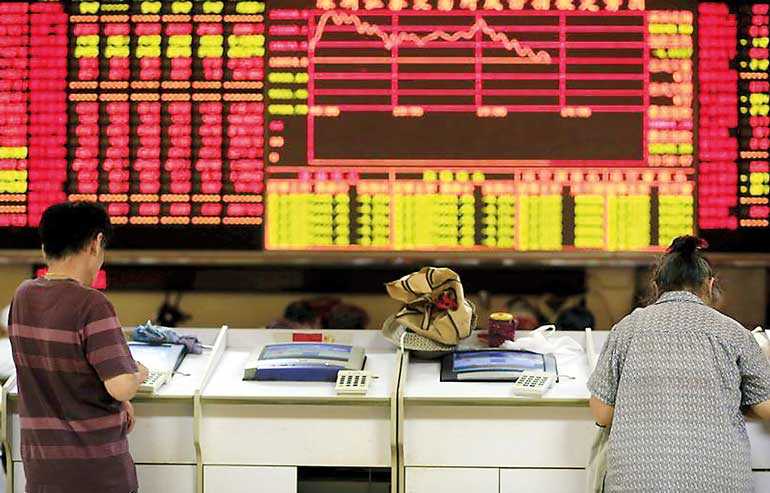Tuesday Feb 24, 2026
Tuesday Feb 24, 2026
Thursday, 23 May 2019 00:37 - - {{hitsCtrl.values.hits}}

LONDON (Reuters): Global stocks were slightly lower yesterday as investors sought safety in bonds, the Japanese yen and Swiss franc in muted trade amid renewed worries over the US-China spat after reports Washington has another Chinese tech firm in its sights.
Relief over Washington’s temporary relaxation of curbs against China’s Huawei Technologies evaporated after reports that the White House is considering further sanctions on Chinese video surveillance firm Hikvision.
Fears of another blacklisting reinforced worries that US President Donald Trump is looking beyond sealing a trade deal with China to a potentially bigger battle aimed at curbing Beijing’s technology ambitions.
The limits which were imposed on Huawei last week and eased on Monday had sent shivers through global semiconductor stocks as investors worried about disruption to suppliers of the world’s number two smartphone maker.
MSCI world equity index, which tracks shares in 47 countries, was down slightly at 0905 GMT, as investors shunned assets considered risky in times of economic and political strife.
The reports rattled European and Asian stocks, with the euro-zone STOXXE down 0.1%.
London’s FTSE 100 blue chips bucked the trend, rising 0.4% as sterling fell amid renewed worries about the country’s messy exit from the EU.
The Chinese markets, which have endured a volatile few months, were on the back foot. The Shanghai Composite Index closed down 0.5%.
The threat dampened Australia’s post-election optimism slightly, but stocks still hovered near the 11-year highs scaled on Monday.
Australia’s stocks index is the only major global bourse to notch up gains since Trump ramped up his battle with Beijing on 6 May, largely due to the election euphoria, while South Korea’s KOSPI is the biggest loser.
With the risk appetite off, investors sought havens in the Swiss franc, Japanese yen and German government bonds.
The yen strengthened away from two-week lows against the dollar, rising 0.1% to 110.39 yen, while the Swiss franc was higher against the euro and the dollar.
Moves across all financial markets were largely muted, though, as many investors preferred to keep to the side-lines.
The standout was the pound, which was down 0.2% at $ 1.2712, its lowest since January amid a deepening crisis over the UK’s exit from the EU after Prime Minister Theresa May’s final gambit failed dramatically.
The euro was little changed at $ 1.1164.
In commodities, US West Texas Intermediate (WTI) crude futures were down 0.6% at $ 62.567 per barrel after American Petroleum Institute data showed that US crude stockpiles rose unexpectedly last week.
Oil was also pressured by Saudi Arabia reiterating that it would aim to keep the market balanced and try to reduce tensions in the Middle East.
Brent crude futures lost 0.7% to $ 71.69 per barrel.